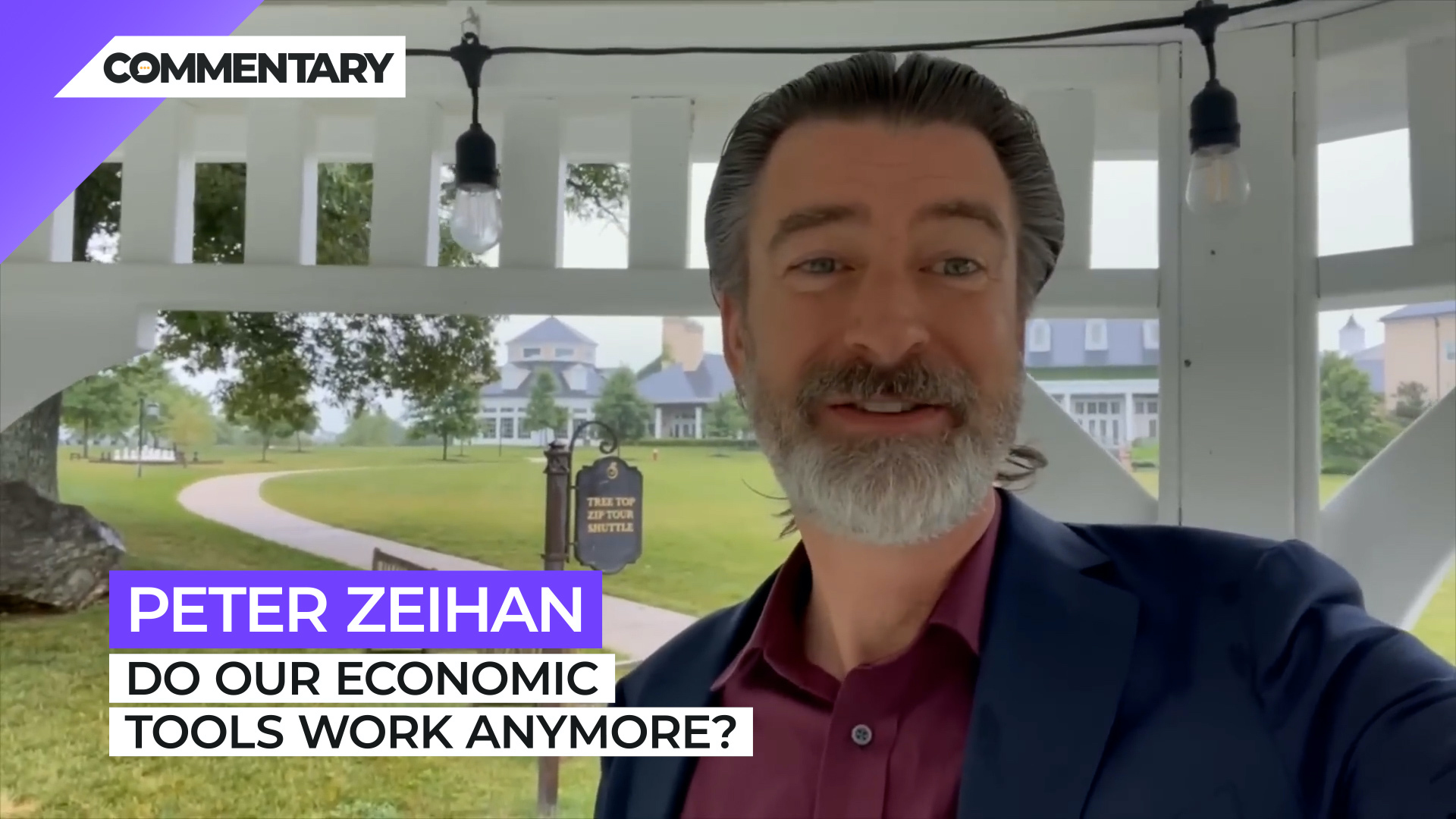
Commentary
-
Our commentary partners will help you reach your own conclusions on complex topics.
Hey everybody, Peter Zeihan here coming to you from the DC area where I’m about to give a work presentation in a room without electricity, because the power’s been out for the last 12 hours. So that’s fun. Two things I wanted to talk about today. The first is the nature of the economic system that we’re trying to wrestle with right now. The new book is called the end of the world is just the beginning and that’s in many ways. A lot of the tools that we have developed to regulate the economic system, most notably interest rates at the federal bank level…we’re not sure if they’re gonna work anymore.
The whole idea of interest rates is that you make the cost of borrowing higher, so that demand becomes more expensive so that people and companies do less of it. But for that to work, you have to have a consumption as a primary drive in your economic system.
Most of the world doesn’t have that any longer. Most of the advanced world hit the point of no return with their demographic aging back in the nineties and places like Germany and Italy and Japan now have more people in their fifties and their forties than their thirties and their twenties and so on. Now in the United States, it hasn’t hit nearly as hard, but we still have this huge generation, the baby boomers are retiring and a very small generation, the Zoomers who are coming into the system right now in calendar year 2022. That’s a shortage of 400,000 workers. And by 2034, that number will have increased to 900,000. This is structural inflation, and this is a problem on the supply side. And when you raise the cost of borrowing, it doesn’t just impact people who are trying to buy a car or a destroyer. It also affects people who are trying to build out… industrial plant and productive capacity and train new workers.
It’s not clear to me whether in places where this demographic decline is advanced, such as Germany, will interest rates even work anymore. Because you are capable of strangling now supply with it and it doesn’t do anything to demand because there isn’t any. The, the economic rules of the past may not apply anymore. Now in the book, I called this something called the end of more, the idea that every economic model that we have developed in the last 500 years, whether it’s fascism or socialism or communism or capitalism, they were designed for an environment where the pie got a little bit bigger every year, largely because of population growth. That’s no longer true.
And so when I look at the problems that the Fed, oh yeah, lovely sound in the background, those are emergency generators. Fun touch, huh? When you look at the problem that the US Federal Reserve is dealing with right now, they would like to get inflation under control and interest rates are the tool they have.
But if we’re in a world where the normal relationships between demand and consumption and supply and production are somewhat out of whack and might not go back, it’s not clear to me that they can raise interest rates to dampen demand without also crushing supply, because we’ve never had a significant problem on the supply side before. And because we are now facing the greatest labor inflation in American history, raising interest rates just might not be the right tool.
And then it comes to the executive branch and that’s a whole other discussion of whether the Biden Administration is up to the challenge. Okay. So that’s the first big topic. I’m not sure that the tools apply anymore.
The second big topic….we made the bestseller list. We came in number 12 on the NYT best seller list late last night. Um, I’m still trying to calm down, but thank you. Thank you. Thank you all. Thank you to everyone who helped put the book together. Thank you to everyone who shared it with your friends. Thank you to everybody who bought a copy or who says they’re going to buy a copy. This has been a wild ride for the last four months with the Russia war. I feel like I’ve dropped the ball in so many ways because there’s so much going on. I’m doing my best to keep up. My team is fantastic, but ultimately it’s for the viewers and the readers out there that have made this happen. So thank you. Thank you. Thank you. Okay. That’s it for me. I’m gonna go see if I can find a place with at least one bar of signal to upload this and I will see you guys next time. Bye.
-
Can other nations replicate success of US shale revolution?
The “shale revolution” has provided the United States with a bountiful domestic supply of oil. But extracting oil from shale is a highly technical process, and it is also dependent on specific geological formations. Straight Arrow News contributor Peter Zeihan tackles the question of whether or not other nations might be able to replicate the…
-
Peace between Israel and Iran, at least for now
A series of recent airstrikes between Israel and Iran inflamed fears of a wider regional war erupting in the Middle East. That concern now seems to have paid off, after third-party countries around the world successfully intervened and talked down military hardliners in both Israel and Iran in order to avoid such an outcome. Israel’s…
-
Global internet in a precarious state, but that could be a positive
Over 500 underwater cables span over 870,000 miles worldwide, serving as the foundation of the modern global internet. Despite their critical role in facilitating communication, these cables often go unnoticed, even as the amount of data transmitted through them has surged. So what happens if the cables fail? Straight Arrow News contributor Peter Zeihan contends…
-
Water wars are an unlikely future
Foreign policy writers have long warned of the possibility that clean drinking water might become “the next oil” — that is, that major wars might be fought around the globe over access to potable water. With expanding populations and finite water supplies, these critics argue that humans will inevitably fight each other to secure drinking…
-
Are Russia’s hypersonic missiles too good to be true?
Russia has reportedly used five of its new hypersonic Zircon missiles to target Kyiv since the beginning of 2024. Russia claims that these sea-based missiles, boasting a range of 625 miles and capable of traveling at nine times the speed of sound, are part of its family of “superweapons” aimed at penetrating the U.S. missile…
Latest Stories
-

Supreme Court justices split over Idaho’s abortion law
-
 Getty Images
Getty Images
Businesses sue over FTC ban on noncompetes
-
 Getty Images
Getty Images
National Enquirer ex-publisher: Tabloid made up stories to help Trump
-
 Getty Images
Getty Images
Bird flu fallout: USDA says milk is safe, states must test dairy herds
-
 Getty Images
Getty Images
Biden administration cracks down on flight refunds and hidden fees
Popular Opinions
-
In addition to the facts, we believe it’s vital to hear perspectives from all sides of the political spectrum.
Latest Opinions
In addition to the facts, we believe it’s vital to hear perspectives from all sides of the political spectrum. We hope these different voices will help you reach your own conclusions.
The opinions published in this section are solely those of the contributors and do not reflect the views of Straight Arrow News.

















Latest Commentary
We know it is important to hear from a diverse range of observers on the complex topics we face and believe our commentary partners will help you reach your own conclusions.
The commentaries published in this section are solely those of the contributors and do not reflect the views of Straight Arrow News.
Peter Zeihan
Geopolitical StrategistPeace between Israel and Iran, at least for now
Global internet in a precarious state, but that could be a positive
Water wars are an unlikely future
Dr. Frank Luntz
Pollster and Political Analyst‘Take the job seriously’: Why Americans are fed up with Congress
‘If we can shrink it, it will stop growing’: Americans talk debt, deficit
‘I don’t think they care’: Undecided voters explain their reasons
Pete Ricketts
U.S. Senator for Nebraska